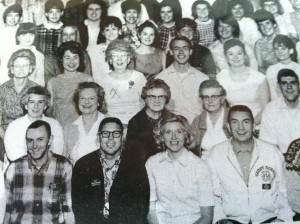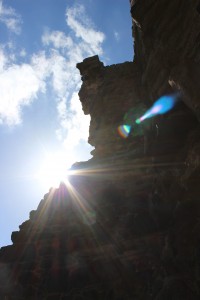I didn’t know on Saturday night that they’d be the last notes I’d play on it. I sat down a few minutes before a woman came in response to our Craig’s list ad and touched the keys with a tune I made up on the fly. It’s what I do best with pianos. Those pesky notes from Bach or Mozart have always felt too confining for me. So I simply sit and play, letting the music well up from my soul and pour out over the keys. I’ve done that multiple hundreds of times on this piano. It’s been a friend. Like a good counselor, my piano’s drawn the depths of joy and sorry out from my soul and given them a voice.
Donna came in while I was playing, a bit emotional, because this kind of playing is part of us. I wooed this woman with a piano about 35 years ago. “Here – I wrote this just for you” I said, lying, as I played whatever came forth while she, starry eyed soaked it in. She’s been my muse ever since.
“This piano was our first purchase” Donna told the meticulously dressed Georgian woman (from the other Georgia, where the accent is Russian) as she ran her fingers over the keys, playing the instrument better than I ever did, ever could.
“Pianos have energy” she said, before telling us about a lovely piano that she’d never allow in her home “even if it were given to me for free” as she went on to explain the dark things that had happened in that piano’s household, with that piano’s people. “The energy the instrument picks up in a home never goes away” she said, “which is why I select my pianos very carefully. You’ve brought positive energy to this piano” she said confidently, and we agreed, telling her that young adults from all over the world had often sung songs around that piano late into the night when we lived in the mountains.
That, of course, was just the tip of the iceberg. That piano brought lots of people together: my sister (with the voice of an angel) and me; a young girl who lived with us for a summer with whom I collaborated on a music project. Later, in Seattle, my children would pick up their instruments (viola, violin, drums, sometimes guitar) and we’d riff on a Sunday afternoon together, or a some nondescript weeknight when one of my children just needed to be with me, and music worked better than words. Like a good climbing rope, the piano kept us connected at times.
“I’ll let you know early next week” she says, as she walks out the door. I sort of forgot about it because of, you know, Sunday and preaching and all that stuff. Then there was a fun family gathering Monday night, and some profound nostalgia because of Giants Baseball (which never gets out of your blood), after which I headed to the mountains for three days of intensive study. I’ve been in administrative mode for much of the summer, and this 3 day window was just what I needed to restore through the disciplines of study and solitude.
Tuesday – Late Afternoon. I’m finished with a productive day of study when the phone rings and my wife haltingly says “I’ve sold the piano – and they’ll be picking it up tomorrow”. Grief hits me like a punch in the stomach as I realize that I’ll never play it again. When we’re finished talking I head out the door into the late afternoon light. I need to breathe, to know a bit of good grief as I let this sink in.
I drive from our mountain place to a nearby trial. Vibrant colors on the trees, fresh snow on the mountains, as muted light penetrates the opaque clouds – my heart nearly breaks for the beauty of it. I’m thinking about the piano and more, as I leave the car for my short mile walk around the pond. After a moment of initial clarity, the clouds lower, and macro is eclipsed by micro. It’s as if all I can see are leaves, the colors, and what I named “the vibrancy of loss”.
“Listen to the leaves” a voice says to my heart – “they’ve something to say – just for you.”
I head down the path and think about the early days of our marriage, and our investment in that beautiful instrument. I was going to be a church musician, and might have been except that I picked up a book on our honeymoon that lit my heart on fire with a passion to know God as a good friend, maybe even a lover of sorts. Soon my love of music was eclipsed by my love of study. Still, the composer in me never died, and when I became a pastor, I played piano and led worship a lot. After all, I led a church of about 40, and after that a house church. Piano players are hard to come by, and so I was always, at the very least, waiting in the wings as the constant understudy. I loved it.
If truth is told though, my days of playing are mostly gone. I still sit to play, even now, on very hard or very good days. But mostly the piano had become furniture, and when the Georgian woman said with her precisely beautiful Russian accent, “I will use this piano to teach many children how to love music and play well – with heart and feeling”, I knew the time had come to say goodbye. After all, that’s what I’m doing in all my other lives.
I’m letting go of my children, as one goes off to Europe, another gets married, and another blossoms into independence so beautifully that I cry when I think about her. I’m shedding my grip on sole leadership as the big cheese teacher in the church lead – not because I’m tired, but out of a strong conviction that passing the torch is the way life is supposed to work. It’s good letting go but, my God – it’s painful at the same time. I know this in the rest of life and now, it seems, my piano has become the embodiment of this season of appropriate, beautiful, and challenging change.
These are the things I’m thinking when the leaves begin to speak. And here’s what the leaves say:
Letting go isn’t just good – it’s inevitable. Don’t fight it. I look at a sapling who’s leaves have all surrendered, except four stubborn ones. They’ll hang on, it appears, until an arctic wind utterly weakens them and forces their surrender. It’s like they’re wishing it was March, when the children were ten and innocent, or when I was ten and sitting with my dad at a Giant’s baseball game. Ah… spring. Innocence. Childhood. The vibrancy of youth. You can let it go, or fight it with liposuction, a new trophy wife, a paranoid grip on power, a perpetual look in the rearview mirror; or you can let your life ripen properly and walk into the glory of autumn, letting old identities, or possessions drop appropriately away. Choose to hang on though, and you’ll let go anyway – it’s just that the letting go will be uglier and more painful than had you surrendered your death grip on that which God wants to so gently remove from you. I look at these leaves and pray that I’ll say yes to every letting go God asks of me.
There’s a matchless beauty in the autumn of life. My life feels more like August than October, but who knows? What I do know is that for the leaves I love, in this month I love, the final days are glorious. God doesn’t marginalize old and tired leaves – setting them away somewhere out of sight so that all the beautiful people can enjoy the prominence of youth and power, even though both are as transient as a bus and less reliable. Why not elevate the beauty of wisdom which, like the leaves of autumn, inspire, elevate, and point to their creator? I look at these leaves and pray that my last days will be the best, the wisest, the most beautiful of all – that I’ll still be a blessing to the very end.
You’re deciduous, not conifer. I look at the two trees, in obvious contrast, and think about how we long to be conifers: perpetually green – always strong, always giving, always…always. I look beyond the fir tree though and see the other, ripened, beautiful colors, knowing full well it’s about to shed some of it’s life. “That’s you” says the tree, and pray a prayer of thanks – grateful that I don’t always need to be on, or strong, or green – grateful for Sabbath, and shedding, and rest.
Your letting go will be a blessing. I look at the ground, at the leaves that have already fallen. I know that their decay will enrich the soil, which will enrich the new young trees, which will enrich the air, and the fowl, and the watershed, and the whole blessed earth. I pick up a leaf and say to it, “because you let go – everything’s enriched.” In a flash, I see children playing piano, some of whom will themselves grow up to bless countless others (for this Georgian lady is a master teacher).
I see new pastors teaching in the church I lead, learning to walk with God, be a blessing in this world, and multiply the presence of hope in our world. I see my children taking their place at the table as adults, each blessing the world in tangible ways. “Yes” I say to myself, “it’s good let go” – of old roles, of possessions, of power, of wealth. Don’t let go too soon. But in season, when the leaves turn glorious colors, know that God is laying the foundation for a new chapter – and this too will be glorious. I pray, grateful that in the wisdom of God, our losses and letting go become the soil of blessing for others.
Before it’s dark, I’m back at the chalet with a long list of things to do. There are lots of green leaves still on the tree that is my life: pastor/ teacher/ leader/ dad/ husband/ mentor/skier/ hiker/climber. But it’s been a priceless walk around the lake because I’m less afraid of the changing colors. Having known a few of them already on the tree that is my life, I’ve been reminded today that in the mercy of God, even losses and times of letting go become blessings.
For a fuller set of pictures from the pond walk, click here.











